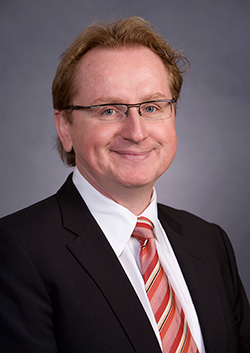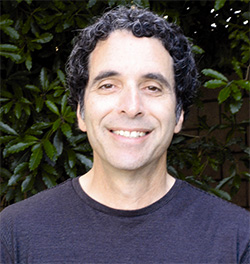Two Plant Biologists at UC San Diego Elected to National Academy of Sciences
April 29, 2008
By: Kim McDonald
Biological Sciences Dean and Biology Professor Receive One of the Highest Honors in Science
The National Academy of Sciences today elected the dean of the Division of Biological Sciences at the University of California, San Diego and another professor in the division to membership in the prestigious National Academy of Sciences, one of the highest honors bestowed on U.S. scientists and engineers.

Steve A. Kay
Steve A. Kay, dean of the Division of Biological Sciences, and Martin F. Yanofsky, chair of the division's Section of Cell and Developmental Biology, were among the 72 new members and 18 foreign associates elected to the academy today "in recognition of their distinguished and continuing achievements in original research."
They join 67 current members of the UC San Diego faculty who previously had been named to membership in the academy, which was established by Congress in 1863 to serve as an official adviser to the federal government on matters of science and technology.
Major research universities use the number of academy members on their faculty as a benchmark by which to compare the strength of their scientific research and education programs among universities across the nation in different disciplines.
Today's election of Kay and Yanofsky, both of whom are plant biologists, underscores the rising prominence and influence of UC San Diego in the biological sciences. Sixteen professors of biological sciences at UC San Diego are members of the prestigious national academy and five of those, including a plant biologist who recently joined the UC San Diego from Indiana University, Mark Estelle, are members of the academy's plant biology section.
"Plant biology is gaining increased importance in the world today with our growing need to develop novel approaches to solving the world's food crisis and to find ways to beat the high prices at the pump and meet our future energy needs through the development of new biofuels," said Kay. "Our leadership in this area and in many other fields of biological sciences makes me confident that we have the scientific talent here at UC San Diego to make great strides in addressing the nation's and the world's future needs in health, food production and the development of new sources of renewable energy."
Kay, a pioneer in the biology of circadian rhythms, joined UC San Diego's faculty last September as dean and holds the Richard C. Atkinson Chair of the Division of Biological Sciences. He was formerly a professor of cell biology at The Scripps Research Institute, chair of its Department of Biochemistry and director of its Institute for Childhood and Neglected Diseases, where he was a faculty member from 1996 to September, 2007. He also holds an appointment as adjunct professor in UC San Diego's Department of Psychiatry.
He has received several noteworthy academic awards, including a Keck Foundation Faculty Award and the Honma Prize for Life Sciences in 1999. His work was cited in Science magazine's "Breakthroughs of the Year" consecutively in 1997 and 1998 and again in 2002. Born in the United Kingdom, Kay received both his bachelor's degree and his Ph.D. in biochemistry from the University of Bristol. He was a member of the faculty of the biology department and the medical school at the University of Virginia and also held a faculty appointment at The Rockefeller University in New York.

Martin F. Yanofsky
Yanofsky, who pioneered molecular and genetic studies in plants, leading to the identification of the major genes that control flower and fruit formation, has been a faculty member at UC San Diego since 1990. He received his undergraduate degree in biology at UC San Diego and his Ph.D. from the University of Washington. He was a National Science Foundation Postdoctoral Fellow in Plant Biology at the California Institute of Technology and was the recipient of a Packard Fellowship for Science and Engineering and a Beckman Young Investigator Award.
The academy's election was held this morning during the business session of the 145th annual meeting of the academy. Those elected today bring the total number of active members to 2,041. Foreign associates are nonvoting members of the Academy, with citizenship outside the United States. Today's election brings the total number of foreign associates to 397.
The National Academy of Sciences is a private organization of scientists and engineers dedicated to the furtherance of science and its use for the general welfare. It was established in 1863 by a congressional act of incorporation signed by Abraham Lincoln that calls on the Academy to act as an official adviser to the federal government, upon request, in any matter of science or technology.
Additional information about the Academy and its members is available at http://www.nasonline.org
